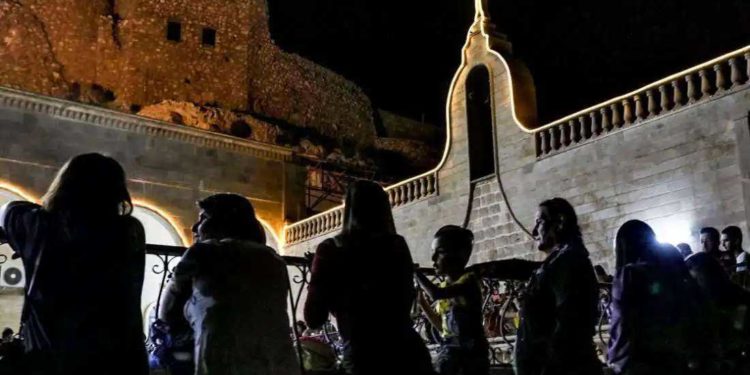The current electoral system is manipulative and fails to ensure political representation of Christians, bishops say
Iraqi Orthodox Christians celebrate Easter Saturday at the church of the ancient Mar Matta monastery of St. Matthew in the village of Bashiqa, some 30km northeast of Mosul, on April 23, 2022. (Photo: AFP)
A bishops’ council in Iraq has called for electoral reforms urging the government to protect the representation of minority Christians in the local and national legislatures and warned Christians may boycott the upcoming elections if their demands remain unmet.
The Nineveh Council representing Catholic and Protestant churches in Mosul and the Nineveh Plain issued a joint statement expressing concerns about the lack of religious minority representation in the electoral system, Fides news agency reported on March 31.
According to the current election system, the majority of elected candidates from Christian reserved seats “end up not really representing the legitimate demands and interests of the Iraqi Christian communities at a political level,” the council said.
The joint statement was issued by Chaldean Archbishop Najib Mikhael Moussa of Mosul-Aqra and Syrian Bishop Nicodemos Daoud Matti Sharaf of Mosul among others.
Bishop Isaac Yousif of the Assyrian Church of the East, Syrian Catholic Archbishop Benedict Younan Mubarak Hano of Mosul, and Bishop Chamoun Daniel of the Ancient Church of the East also signed the statement.
The council’s letter comes following allegations of major political parties “hijacking” the seats allotted to the Christian minorities in the nation.
“The vote to elect the candidates destined to occupy the seats reserved for the Christian component is not exercised exclusively by Christian voters,” the bishops said.
“Even non-Christians can vote to assign the five seats that in theory should be reserved for the Christian component. In this way, the majority political forces are also able to pilot the allocation of seats reserved for minority components, including Christians,” the bishops further added.
Nine seats in the 329-seat Iraqi parliament are allocated to religious minorities including five seats for Christians scattered across 83 districts in the country.
The five reserved seats are allotted to Baghdad, Nineveh, Kirkuk, Erbil, and Duhok provinces where most of the country’s remaining Christians live.
The council has also made a proposal that could alleviate the current concerns and give more transparency in whatever remains of the democratic voting process.
It suggested setting up a Register of Christian voters and electors qualified to cast their votes in five parliamentary seats reserved for the community.
“The establishment of such a register would be in full harmony with the Iraqi Constitution and Supreme Court pronouncements regarding electoral procedures,” the bishops said.
The council has also warned the parliamentarians that if transparency in some form is not set up in the electoral process, then the Christian community will be forced to call for the removal of the reserved seats for their candidates.
The cancellation request was “to prevent even those seats reserved for Christian candidates from being effectively occupied by people who do not effectively represent the needs of Iraq’s Christian communities,” the council said.
If the demand for transparency is not met, then the Christian community in the nation will be forced to take “the path of an electoral boycott,” the council warned.
The 2021 legislative elections were marred by controversies and allegations regarding the distribution and method of assigning seats reserved for Christian candidates.
Reportedly, Joseph Sliwa, deputy chair of the Bethnahrin Patriotic Union alleged in 2021 that the five legislators elected from reserved seats did not represent Iraqi Christians.
He had further alleged that 90 percent of the votes cast in their favor had not come from Christian voters.
A similar accusation emerged in the 2018 elections wherein critics pointed out vote manipulation within the ranks of major political groups of Shiite and Kurdish origin.
These groups allegedly urged their supporters to vote for their candidates running in the Christian-reserved seats in a bid to plant their men as legislators in the area.
During the 2021 elections, four out of five seats were won by an outfit named “Babylon Movement” which claimed to be pro-Christian.
However, the outfit is considered to be connected to the Iranian Shiite militias such as Hashd al Shaabi or Popular Protection Units. Its Christian leader Rayan al-Kaldani is sanctioned by the US treasury for human rights abuses and corruption, media reports say.
Iraq was home to more than one million Christians before the US invasions in 2003.
However, sectarian violence and the reign of the terror outfit, Islamic State, forced thousands of Christians to flee Iraq.
In 2021, an estimated 300,000 Christians were living in Iraq.
Pope Francis visited Iraq on March 5-8, 2021, becoming the first pope to visit the country. He met with Christians and representatives of other religions as well as political leaders with a message of hope, peace, and harmony.
Latest News
Credit: Source link




